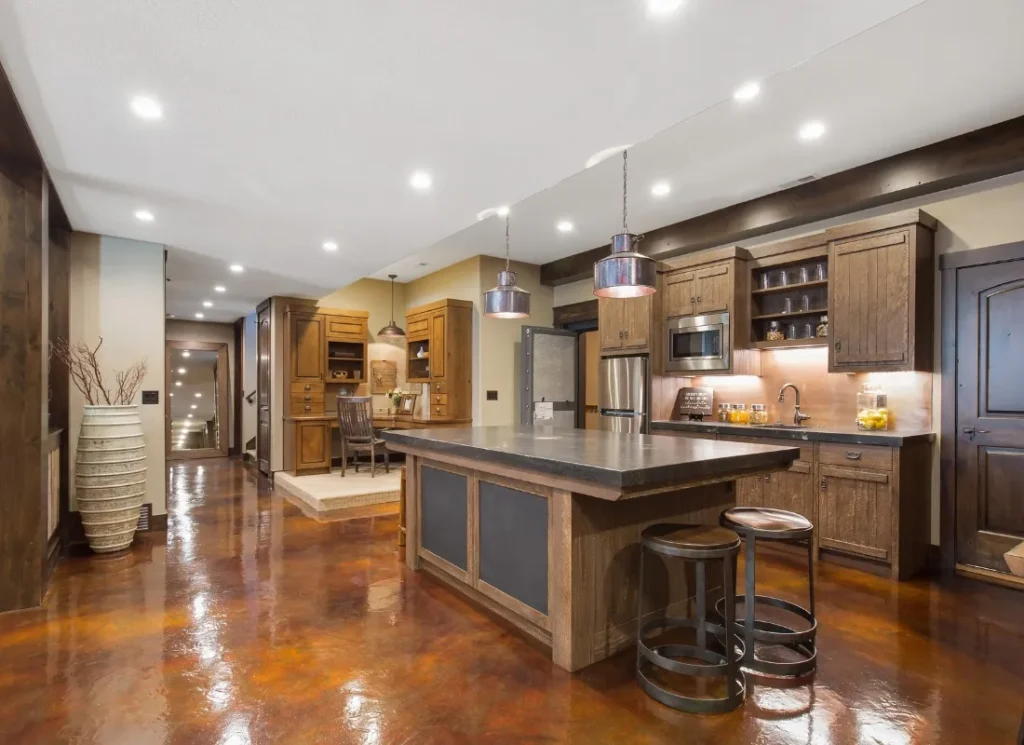When it comes to basement renovations, one of the most crucial decisions you’ll make is the type of flooring you choose. Your basement may serve as a family room, a home office, or even an entertainment hub. Whether you’re looking for something durable, cozy, or stylish, the right flooring will enhance the space and ensure it can withstand the challenges that basements typically face. Let’s break down the best basement flooring options, so you can make the right choice for your renovation.
1. Waterproof Vinyl Flooring: A Basement’s Best Friend
One thing that can easily ruin your basement remodeling dreams is water. Between humidity and potential flooding, your basement is highly vulnerable to moisture damage. That’s where waterproof vinyl flooring comes in as a fantastic solution. This flooring is not only resistant to moisture but also offers a stylish, modern look that complements a variety of basement designs.
Why Choose Waterproof Vinyl for Basement Flooring?
- Water Resistance: The material is entirely waterproof, meaning you won’t have to worry about spills, floods, or dampness.
- Variety of Designs: You can find vinyl flooring that mimics the look of wood, stone, or tile, giving your basement an upscale look without the price tag.
- Easy to Maintain: Vinyl is incredibly easy to clean and maintain, requiring only occasional sweeping and mopping.
Waterproof vinyl is also softer underfoot compared to harder surfaces like tile or hardwood, which makes it perfect for a comfortable basement hangout spot. And if you’re installing your basement flooring yourself, vinyl is relatively easy to work with, which saves you both time and money.
2. Luxury Vinyl Planks (LVP): For the Look of Hardwood Without the Risk
If you love the look of hardwood flooring but don’t want to risk warping or water damage, luxury vinyl planks (LVP) could be a perfect fit for your basement. LVP offers a striking resemblance to real hardwood but comes with all the benefits of vinyl, like durability and moisture resistance.
What Makes LVP Ideal for Basement Flooring?
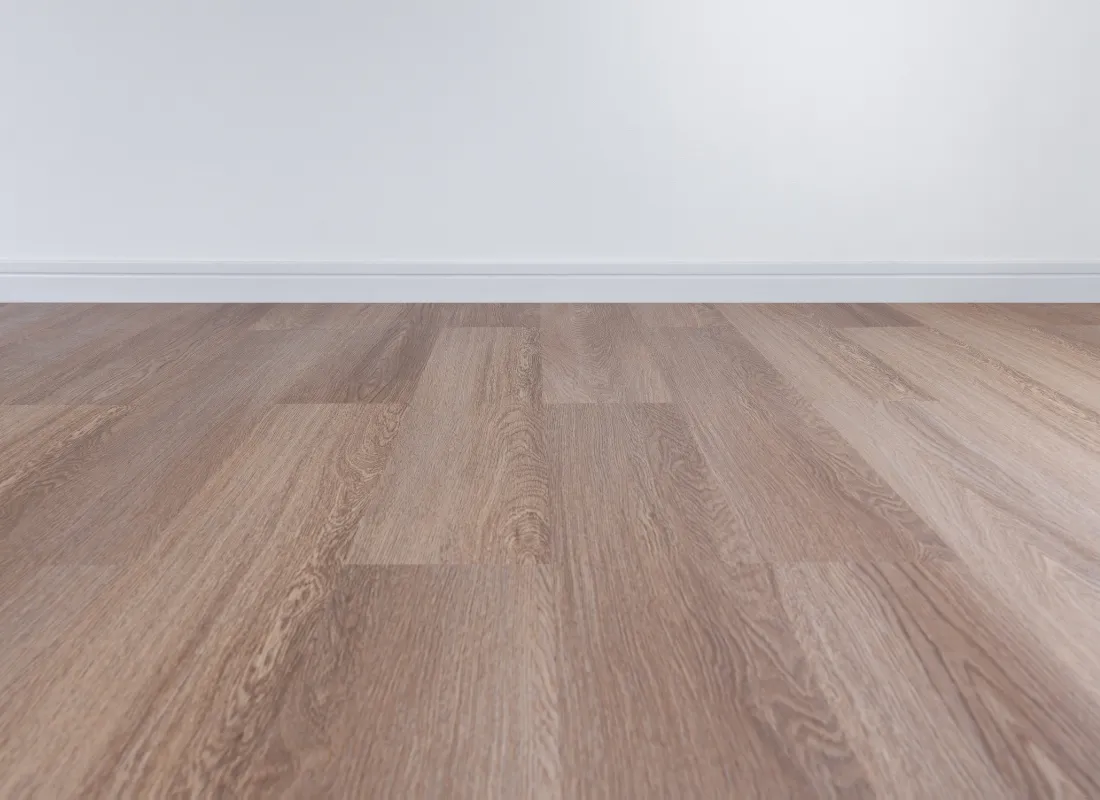
- Appearance: It looks just like hardwood but doesn’t require the upkeep of real wood.
- Moisture Resistance: LVP is waterproof, so it’s well-suited to basement environments where moisture can be an issue.
- Durability: LVP is resistant to scratches, dents, and scuffs, making it an ideal choice for high-traffic areas.
With LVP, you can have the charm of wood without worrying about the consequences of moisture. It’s also relatively easy to install, which can save you time and money during your renovation.
3. Tile Flooring: Timeless and Durable for Basements
Tile flooring, especially porcelain or ceramic tiles, has always been a popular choice for basements. They’re durable, water-resistant, and can withstand significant temperature changes. Whether you choose classic white tiles, a bold pattern, or something more textured, tile offers an array of design possibilities for your basement renovation.
Why Opt for Tile in Your Basement?
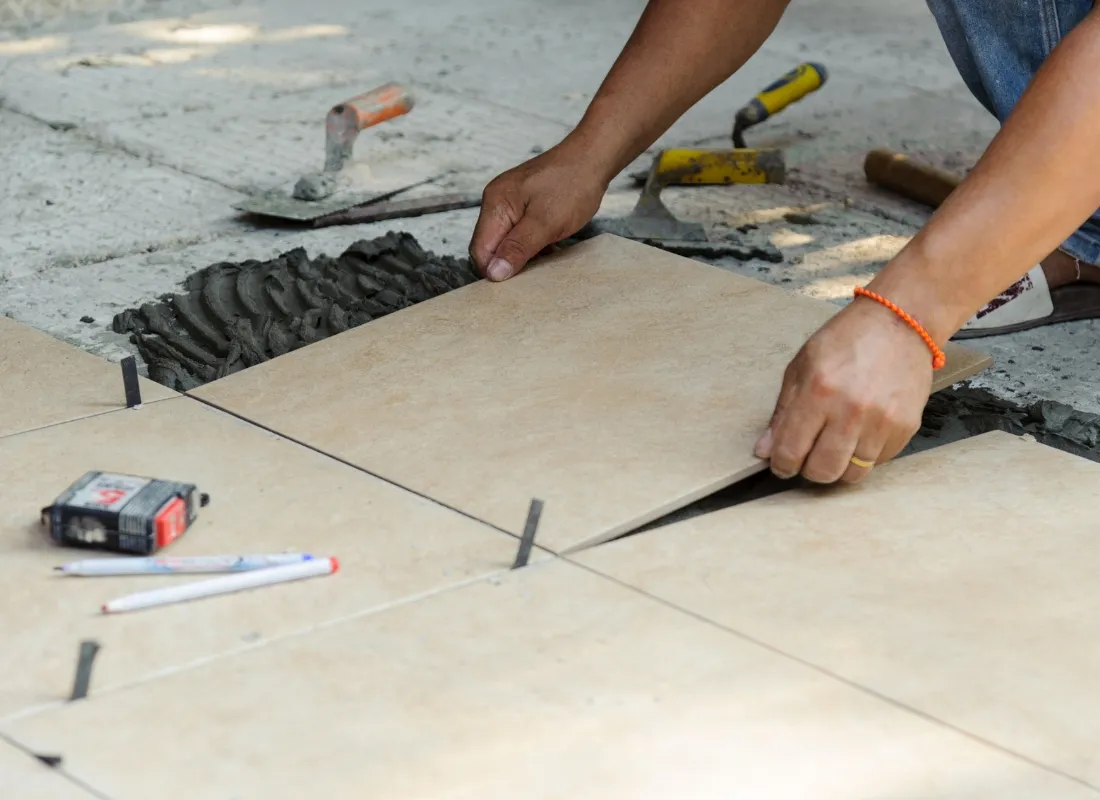
- Durability: Tile is long-lasting, resistant to moisture, and can handle heavy foot traffic.
- Temperature Control: Tiles can stay cool in the summer and feel warm with the right underfloor heating in winter.
- Easy to Clean: Spills won’t pose a problem, and cleaning is a breeze with tile flooring.
Tile flooring comes in different styles, including ceramic, porcelain, and even stone options, which gives you flexibility when choosing your basement look. It’s a great choice for basements that will be used for things like laundry rooms or bathrooms due to its ability to handle water without warping or staining.
4. Concrete Flooring: Sleek and Durable
If you’re going for a modern, industrial look, concrete flooring might be the way to go. Not only is concrete incredibly durable, but it’s also incredibly versatile. You can leave it as is for an edgy look or apply a variety of finishes to give it more style.
Why Concrete is Great for Basements:
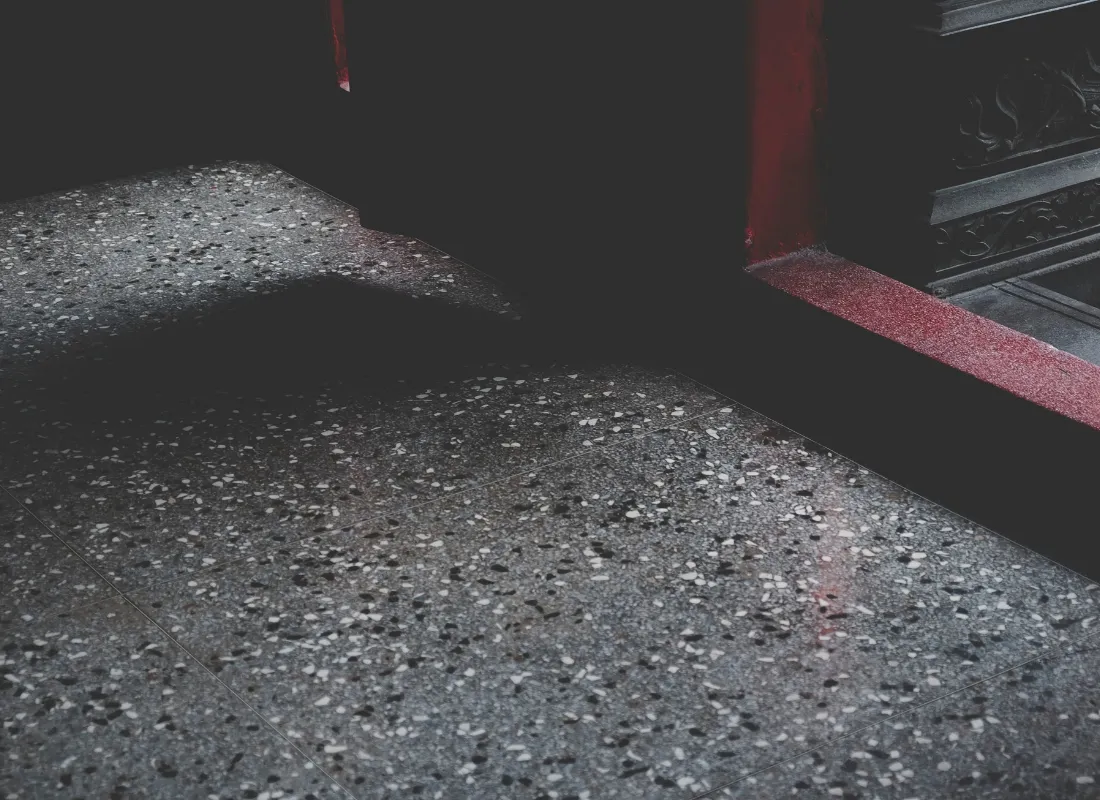
- Sturdiness: Concrete is one of the most durable materials, able to withstand heavy equipment, furniture, and foot traffic.
- Moisture Resistance: When sealed properly, concrete is impervious to moisture and prevents mold and mildew growth.
- Customization: You can stain or paint concrete to match your aesthetic preferences. Polished concrete offers a sleek, shiny look, while more textured concrete gives an industrial feel.
Concrete’s main disadvantage is that it can be cold and hard on your feet. But, you can fix this by adding area rugs, carpeting, or even radiant heating underneath for added comfort.
5. Carpet Tiles: Comfortable and Easy to Install
Carpet might not be the first material that comes to mind when thinking about basement flooring, but carpet tiles are a viable option for creating a cozy and inviting atmosphere. Carpet tiles come in a variety of colors and patterns, so they can fit any design style, from modern to traditional.
Why Choose Carpet Tiles for Your Basement?
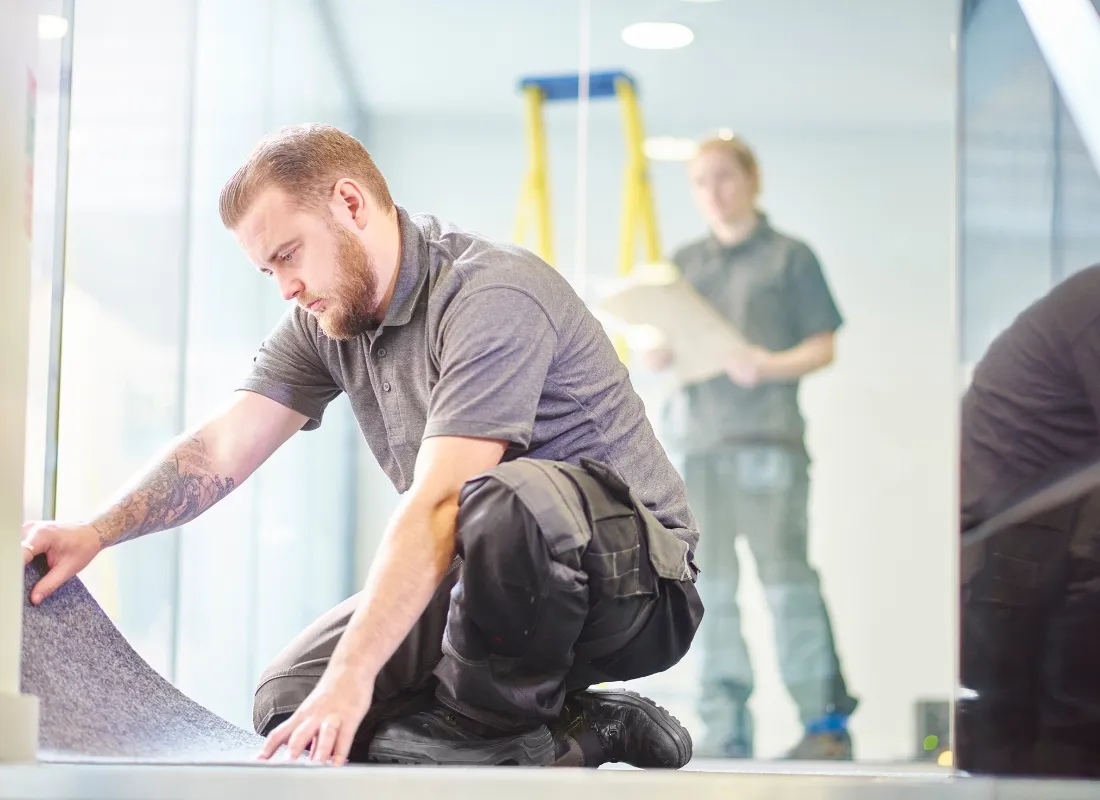
- Comfort: Carpet provides warmth and comfort, which is especially nice in cooler basements.
- Easy to Install: Carpet tiles are easy to install and replace, making them a good option for DIY renovators.
- Moisture Resistance: While traditional carpet is a poor choice for basements, many modern carpet tiles come with moisture-resistant backing, helping prevent mold and mildew.
Carpet tiles are also a great choice if you want to add color, texture, or pattern to your basement without committing to a full wall-to-wall carpet. If one tile gets damaged, it’s easy to replace without tearing up your whole floor.
6. Cork Flooring: Eco-Friendly and Warm
Cork flooring is one of the more eco-friendly options available for basement floors. It’s made from the bark of cork oak trees, making it a renewable resource. Cork is soft underfoot, and its natural insulation properties make it a great option for keeping basements warmer in winter.
Why Choose Cork for Your Basement?
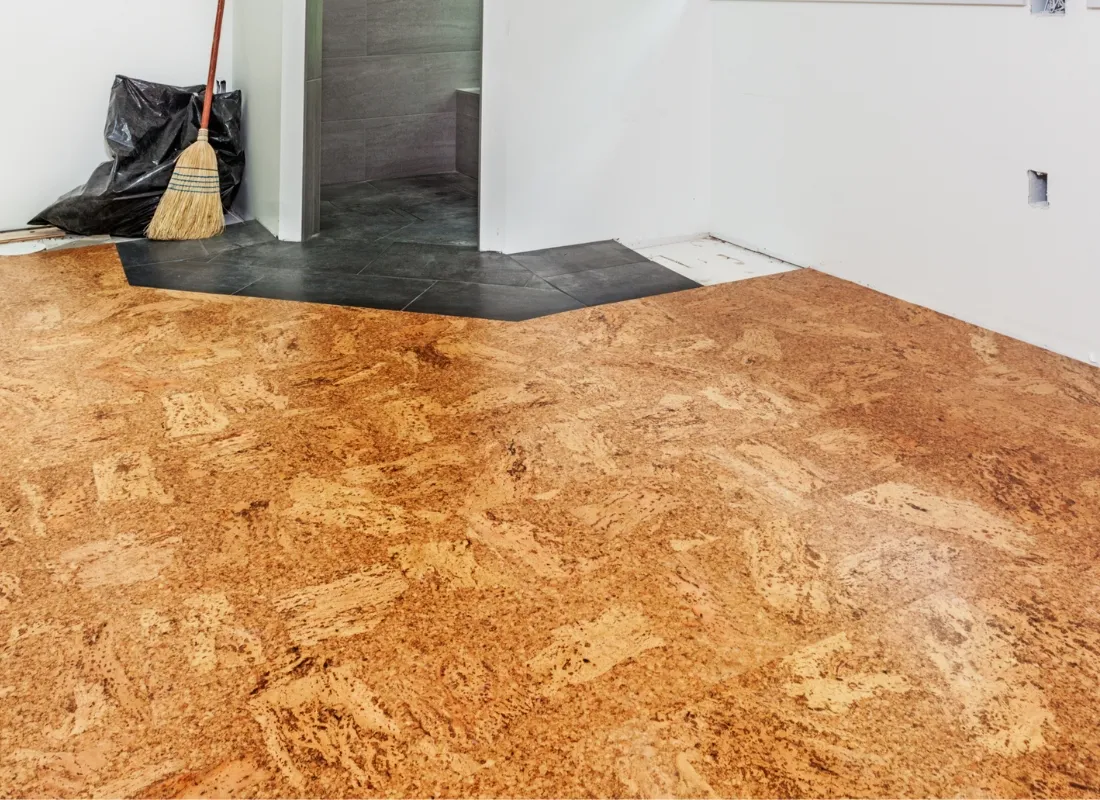
- Eco-Friendly: Made from a renewable resource, cork is a sustainable and green option.
- Natural Insulation: It keeps the basement warmer and more comfortable compared to other flooring options.
- Noise Absorption: Cork naturally absorbs sound, so it’s a great option if you plan on making your basement a home theater or music room.
Cork flooring is also naturally resistant to mold and mildew, making it an ideal choice for basements prone to moisture. Just make sure it’s sealed well to prevent damage from water.
Choosing the right basement flooring is about more than just aesthetics—it’s about making sure the floor can handle moisture, temperature fluctuations, and heavy foot traffic while still looking great. With so many options like waterproof vinyl, luxury vinyl planks, tile, concrete, carpet tiles, and cork, you can find the perfect flooring to complement your basement renovation.
Keep in mind that some materials, like vinyl or tile, will be easier to install yourself, while others, like concrete or natural stone, may require a professional. It’s always a good idea to talk to an experienced contractor who can help guide you toward the best option for your space and needs.
If you’re looking for professional assistance with your basement renovation, Deomax Group is here to help! We specialize in transforming basements into functional, beautiful living spaces, and we can help you choose the best flooring to suit your needs.


